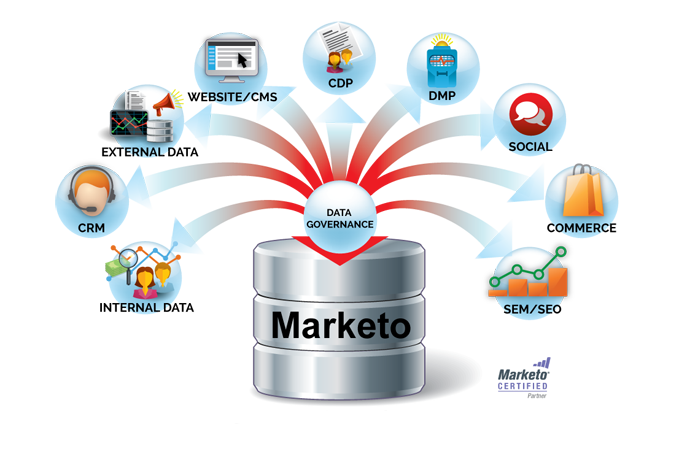Introduction
Marketo is a popular marketing automation platform that helps companies manage their marketing campaigns and track customer interactions. Effective data management is crucial for the success of marketing automation, as it ensures that the data used in marketing campaigns is accurate and reliable. In this article, we will discuss the importance of data management in Marketo and how a Marketo consulting firm can ensure clean, accurate data.
The Importance of Clean and Accurate Data
One of the essential components of effective data management in Marketo is ensuring that the data is clean and accurate. This means identifying duplicate records, standardizing data, and enriching data. Let’s take a closer look at each of these processes.
Clean and accurate data is the foundation of effective marketing automation in Marketo. Without clean and accurate data, companies risk wasting resources on ineffective marketing campaigns and inaccurate lead scoring.
Identifying Duplicate Records
Duplicate records are a common problem in Marketo, and they can cause several issues. For example, if a company sends a marketing email to a duplicate record, it wastes resources and can annoy the recipient. Additionally, if leads are scored based on their interactions with duplicate records, it can lead to inaccurate lead scoring. A consultant can help identify and eliminate duplicate records by running data audits and implementing data governance policies. This involves reviewing the data in Marketo to identify duplicate records and then merging or deleting them as necessary.
Standardizing Data
Standardizing data in Marketo involves ensuring that the data follows a consistent format. This can include standardizing job titles, company names, and other key data points. Standardized data is easier to use in marketing campaigns and provides a more accurate view of customer behavior and preferences. A consultant can help establish data governance policies that ensure data is consistently formatted, making it easier to use in marketing campaigns.
Data Enrichment
Data enrichment involves enhancing the data in Marketo with additional information. This can include adding demographic data, firmographic data, and other useful insights. By enriching their data, companies can gain a better understanding of their customers’ behavior and preferences, leading to more effective marketing campaigns. A consultant can help implement data enrichment strategies that provide valuable insights into customer behavior and preferences.
Improved Marketing Campaigns
Clean and accurate data can lead to more effective marketing campaigns in several ways. First, it allows companies to create more targeted campaigns that are tailored to customers’ needs and preferences. For example, if a company has accurate data on a customer’s job title and industry, they can create marketing content that is more relevant to that customer’s interests. Additionally, clean and accurate data allows companies to track customer interactions more effectively, providing valuable insights into which marketing campaigns are most effective.
Better Lead Scoring
Lead scoring is a process that assigns scores to leads based on their behavior and attributes. Clean and accurate data is essential for effective lead scoring, as it ensures that leads are accurately scored based on their behavior and attributes. For example, if a lead interacts with a company’s marketing content multiple times, they may be scored higher than a lead who only interacts once. However, if the data on those interactions is inaccurate or incomplete, the lead may be scored incorrectly.
Increased ROI
Clean and accurate data can lead to increased ROI for companies using Marketo. By ensuring that the data used in marketing campaigns is accurate and reliable, companies can make more informed decisions about how to allocate their marketing resources, leading to increased ROI. For example, if a company has accurate data on which marketing campaigns are most effective, they can allocate more resources to those campaigns, leading to a higher ROI.
The Role of a Consultant in Data Management
A consultant can play a crucial role in helping companies manage their data in Marketo. This includes conducting data audits, implementing data governance policies, and educating users on best practices.
Conducting Data Audits
Data audits involve reviewing the data in Marketo to identify errors, inconsistencies, and opportunities for improvement. A consultant can help companies conduct data audits, providing valuable insights into how to improve data quality and accuracy. Data audits typically involve:
- Identifying duplicate records and merging or deleting them as necessary.
- Identifying incomplete or inaccurate data and correcting it.
- Standardizing data to ensure that it follows a consistent format.
- Enriching data with additional information, such as demographic or firmographic data.
Implementing Data Governance Policies
Data governance policies are a set of rules and guidelines for managing data in Marketo. A consultant can help companies implement data governance policies that ensure data is consistently formatted, accurate, and reliable. This involves:
- Creating a data dictionary that defines key data points and their allowed values.
- Establishing data entry standards to ensure that data is consistently formatted.
- Defining data quality metrics and monitoring them regularly.
- Establishing data ownership and accountability to ensure that data is maintained properly.
Educating Users on Best Practices
Effective data management in Marketo requires buy-in from all users. A consultant can help educate users on best practices for managing data in Marketo, ensuring that everyone is working towards the same goal of clean, accurate data. This involves:
- Providing training on data entry standards and best practices.
- Communicating the importance of data quality and accuracy.
- Encouraging users to report any issues or inconsistencies they encounter.
- Providing ongoing support and guidance to ensure that users are following best practices.
In addition to these specific tasks, a consultant can also provide valuable strategic guidance on how to use data in Marketo to achieve business goals. For example, a consultant may recommend specific data enrichment strategies to gain deeper insights into customer behavior and preferences. They may also help companies set up automated data management processes that save time and resources.
Conclusion
Effective data management is crucial for the success of marketing automation in Marketo. By ensuring that the data used in marketing campaigns is clean and accurate, companies can create more targeted and effective campaigns, improve lead scoring, and increase ROI. A consultant can play an essential role in helping a company manage their data in Marketo by conducting data audits, implementing data governance policies, and educating users on best practices. By working together towards the goal of clean, accurate data, companies can achieve greater success in their marketing automation efforts.

















